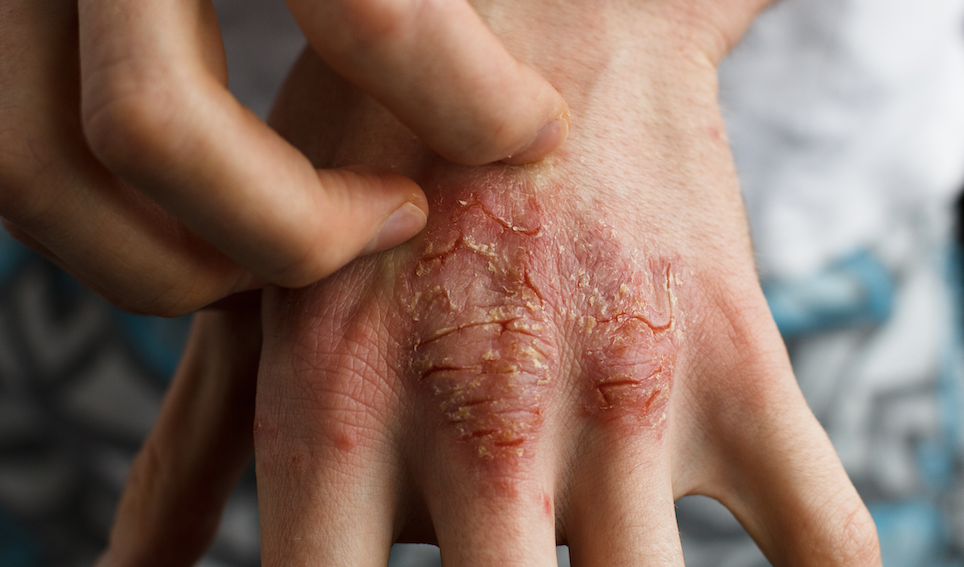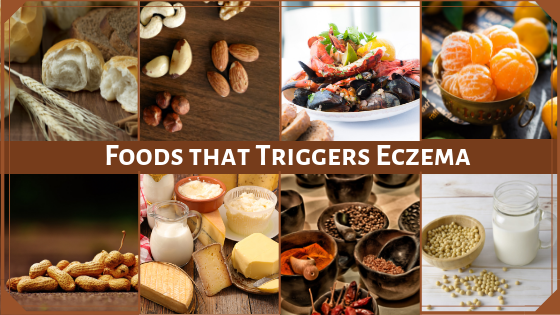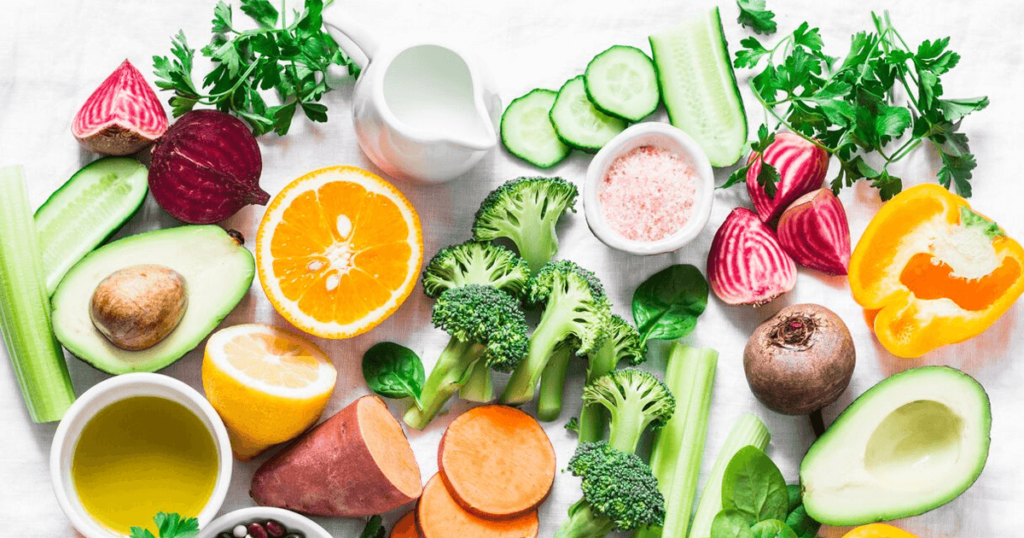Many patients with eczema also have dietary allergies or sensitivities. To reduce the severity of allergies and eczema, it’s essential to identify your unique dietary requirements, as each person is unique. Reducing symptoms may also involve identifying and avoiding known allergies. In this article, we will tell ypu the top foods to avoid during eczema.
What is Eczema?
Eczema, or Atopic dermatitis, is a dermatological condition characterized by dry, itchy, and rough skin. This condition weakens the barrier function of your skin, which is essential for retaining moisture and safeguarding your body from outside factors. Eczema is a chronic condition that occasionally flares up. It’s not contagious, although it can be irritating. Food allergies, hay fever, and asthma are all possible side effects for those with atopic dermatitis.
The signs of eczema can differ greatly from person to person and can occur anywhere on the body. They could consist of:
- Chapped skin
- Itchiness
- Thickened skin
- Rash on swollen skin
- Dark bumps on the skin
- Sensitive and crusty skin
- Darkening of color around the eyes
Apart from food, numerous other factors might cause eczema. These triggers can be your environment, stress levels, or the products you topically apply to your skin. This could make figuring out what’s causing your outbreaks more difficult.
Although it could create a flare-up if you already have eczema, eating particular foods doesn’t seem to cause the condition. People with eczema may benefit from certain diets, such as a Mediterranean or anti-inflammatory diet. Other plant-based diets, including a dyshidrotic diet, can help control the symptoms of this particular kind of eczema.
ALSO READ: AUTISM CREATURE: ALL YOU NEED TO KNOW
Foods to Avoid During Eczema
Although food may not be the direct cause of eczema, it can aggravate the condition or trigger flare-ups. This is especially the case if you consume a meal to which you are allergic or sensitive.While not everyone may experience problems with the items on this list, the following are common foods to avoid during eczema.
Red Meat
Histamine levels in red meat, particularly processed meats, can be high. Histamines are compounds that can cause allergic reactions and inflammatory responses. Since certain eczema sufferers may be histamine sensitive, increasing histamine consumption may cause or exacerbate eczema symptoms. Red meat contains more omega-6 fatty acids than omega-3 fatty acids. Since inflammation is a major component of eczema, an imbalance in the diet between these two kinds of fatty acids could contribute to inflammation, which is a key factor in eczema.
Gluten
In people with celiac disease or gluten sensitivity, eating gluten may cause an immunological reaction. This immunological reaction could cause inflammation all over the body, which could impact the skin and aggravate the symptoms of eczema. Moreover, some people who are sensitive to gluten may develop a condition known as “leaky gut.” This happens when the intestinal lining becomes more porous, making it possible for things like gluten to enter the bloodstream. After being exposed to these substances, the immune system may respond, causing inflammation that may show up as eczema or other skin problems.
Diary
If you are searching for foods to avoid during eczema, then you should definately skil Diary. It is well established that dairy products, especially cow’s milk, may trigger eczema in certain people. Casein and whey, two proteins included in cow’s milk, may cause allergic reactions in certain individuals. Allergic reactions can manifest as skin issues, including eczema. Although it can also happen to adults, this kind of response is more common in newborns and young children.
Diary products can also trigger eczema in lactose intolerants. People who are intolerant to lactose, the sugar found in milk, may not have the enzyme necessary to properly digest lactose. In addition to causing digestive problems, lactose intolerance can occasionally be linked to skin conditions like eczema.
Peanut
For those who have nut allergies, peanuts and tree nuts in general can potentially cause flare-ups of eczema. As one of the main allergens, peanuts can cause allergic reactions in those who are allergic to them. Itching, redness, and eczema are among the skin symptoms that can be caused by allergic responses.
When peanuts or peanut residues come into contact with other foods or surfaces, cross-contact may happen. For those who are sensitive to this nut, even trace amounts of peanuts might cause allergic responses that could result in eczema symptoms.
Shellfish
For those who are allergic to shellfish, shellfish, especially crustaceans like prawns, crabs, and lobster, may aggravate eczema symptoms. Just like red meat, shellfish is also high in histamine. Therefore, eating shellfish can release histamine in those who are allergic to shellfish, which can aggravate eczema symptoms and cause skin irritation. If you have a shellfish allergy, you must avoid all shellfish, including prawns, crab, lobster, and other crustaceans.
You must read food labels carefully to find any potential cross-contamination or hidden sources of shellfish. Shellfish ingredients can be found in several processed foods, sauces, and seasonings.
ALSO READ: VITAMIN P: ALL YOU NEED TO KNOW
Alcohol
Since alcohol is a diuretic, it can cause dehydration by increasing the production of urine. Skin that is dehydrated is more prone to irritation, which can worsen the symptoms of eczema. Alcohol consumption may also lead to vasodilation, which increases blood flow to the skin and produces flushing and irritation. This might aggravate and increase redness in people with sensitive skin or eczema. Moreover, drinking too much alcohol might weaken immunity, which could make it harder for the body to control inflammatory reactions, such as those linked to eczema.
If you choose to drink alcohol, be mindful of how much of an influence it may have on your overall health and skin. Plus drink lots of water prior to, during, and after consuming alcoholic beverages to counteract the drying effects of alcohol.
Eczema-Friendly Diets
Although there isn’t a single diet that works for everyone with eczema, eating a well-crafted diet can improve your overall health. Following are a few eating plans that may help you manage your symptoms:
Elimination Diet
Those who don’t know what causes their eczema may benefit from an elimination diet. During an elimination diet, you cut out possible food triggers for a while before introducing them gradually, one at a time, while keeping an eye on your symptoms. Working with a dietitian to develop an elimination diet will ensure you obtain enough nutrients and meet all your dietary requirements.
Gluten-free Diet
According to research, celiac disease and eczema appear to be related in many people. This could be as a result of the conditions’ genetic link. You can treat celiac disease by eliminating gluten from the diet. If you cut out gluten, your skin might improve if you have eczema along with celiac disease or gluten sensitivity. Foods without gluten are becoming increasingly popular, and many products now come with gluten-free labels. In fact, many wheat, rye, and barley items are on the market with gluten-free alternatives.
Mediterranean Diet
The Mediterranean diet prioritizes whole foods, plant-based meals, and lean protein above processed foods. It also restricts red meat and alcohol consumption to a moderate level. While there is limited evidence to support the advantages of the diet for eczema, the omega-3 fatty acids and quercetin found in the diet may help reduce inflammation.
Anti-inflammatory Diet
Anti-inflammatory diet plans focus on consuming fiber-rich foods and avoiding foods that worsen inflammation. It is important to point out that there is no one anti-inflammatory diet, as different people may be sensitive to different foods’ inflammatory properties. However, generally speaking, this diet emphasizes:
- Fruits
- Veggies
- Legumes
- Omega-3 fatty acid-rich foods
Moreover, this diet plan limits food that has been heavily processed. It also discourages the consumption of red meat. Eating an anti-inflammatory diet may help reduce inflammation in your body.
ALSO READ: HOW LONG DOES COKE STAY IN OUR SYSTEM
Dyshidrotic diet
The dyshidrotic diet may help control dyshidrotic eczema. The symptoms of dyshidrotic eczema may be brought on by or made worse by exposure to nickel and cobalt. These metals may be present at trace levels in a variety of foods.
You can find cobalt and nickel in:
- Whole grains, such as buckwheat, wheat, and oats; legumes, such as chickpeas and soy products
- Seeds and nuts, particularly flaxseed and Brazil nuts
- Red meat, particularly organ meats like liver.
- Dairy items, such as cow milk
- Fruits
- Veggies like potatoes and cantaloupe
- Tea and coffee, chocolate and cocoa
Limiting food items containing these elements is part of a dyshidrotic diet, which helps people hypersensitive to these metals experience fewer flare-ups.
Foods strong in vitamin C may help limit nickel absorption; thus, consuming plenty of fresh fruits and vegetables may be beneficial. These consist of oranges, raspberries, broccoli, and tomatoes.
A diet that allocates points to foods and beverages containing certain metals according to their metal content may be advised by certain dermatologists. Then, in order to stay under a specific threshold, individuals with these hypersensitivities monitor the points for the food they eat. So, these were the foods to avoid during eczema.
Foods to Avoid During Eczema: Final Word
What you eat is one of many factors that might trigger your eczema. While no diet works for everyone to reduce eczema symptoms, it’s generally a good idea to avoid items that seem to exacerbate your symptoms. Try eating a diet rich in fresh produce, lean protein, and healthy fats. This might lessen flare-ups of eczema. In this article, we have discussed all the foods to avoid during eczema.



